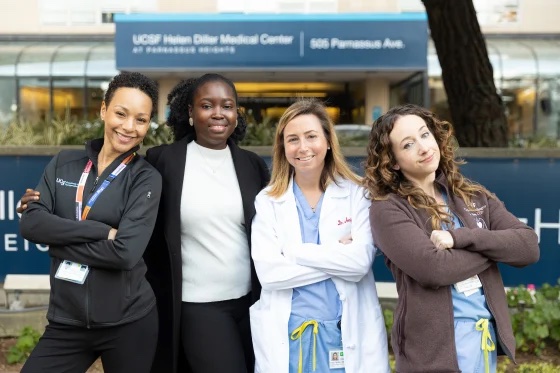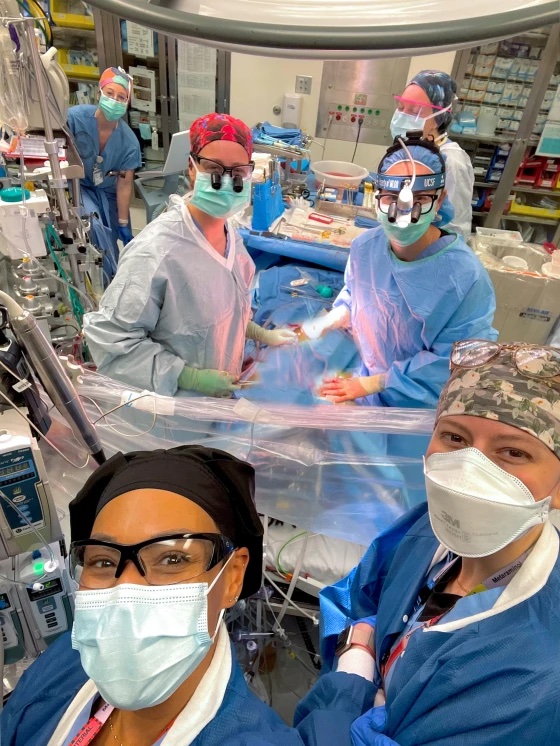Meet the all-women team that is likely the first to perform a heart transplant
SOURCE: TODAY
Dr. Amy Fiedler was finishing up a standard heart transplant surgery in December — putting the dressings on the patient and getting ready to transport her the intensive care unit — when she noticed something she'd never seen before. The room was entirely women.
Behind all the surgical masks and gear, she saw the perfusionist (who runs the heart-lung machine), the nursing staff and even the patient were all female.

Dr. Charlene Blake, cardiac anesthesiologist, Fatou Gaye, Dr. Amy Fiedler, cardiac surgeon, and Ashley Risso, perfusionist, outside of UCSF. Courtesy UCSF
Fiedler, a cardiothoracic surgeon at University of California, San Francisco, turned to Dr. Charlene Blake, a cardiac anesthesiologist. "Has this ever happened before?" Fiedler asked Blake, she tells TODAY.com.
"We all looked around. It was joyful," Blake recalls to TODAY.com. "We celebrated how far we've come, but it's also like, 'Wow, it took this long for something like this to happen?'"
Females are underrepresented in almost all professions that are involved in cardiac surgery, from surgeons to anesthesiologists to trainees, Fiedler explains. She says she's currently the only woman heart transplant surgeon at UCSF.
“To be in a position at an institution where we have a woman cardiac surgery attending, a woman cardiothoracic anesthesiologist and then a woman cardiac surgery trainee, it’s just really unique to have all of those pieces fall into place,” Fiedler says.
In awe of the moment, Blake snapped a selfie, which generated buzz after UCSF posted it on their social media accounts. "She has long arms and was in the best position for it," Fiedler laughs
This is not the first milestone for women in medicine at UCSF. Fiedler explains that a previous chair of the department of surgery at UCSF, Dr. Nancy Ascher, is the first woman to ever perform a liver transplant.
"Her presence is still felt at UCSF," Fiedler says. "She still is clinically active, and without her leadership and stewardship, I don’t think much of the great kind of diverse population of individuals that have come together at UCSF would have been possible."
While the moment was historic for the community, the team explains that it was merely based on luck. “It’s effectively random. It’s a call schedule. You roll the dice, and if there’s a case, then that’s what you do,” Fiedler says.
When the patient, Fatou Gaye, came into UCSF, Fiedler happened to be on call.
Gaye was evaluated by the multidisciplinary heart failure group, who diagnosed her with heart failure from giving birth. She was deemed suitable candidate for a heart transplant and placed on the waiting list. When she was accepted, Fiedler found her a donor.
“To be part of a historic moment, it was empowering. It was lovely,” Blake adds. “But it was also another day at work. This happened by random, but nothing is truly random.”
Dr. Laura Scrimgeour, the cardiac surgery fellow in the operating room, says there's a lot of barriers for women in the cardiac surgery field, so she feels lucky to have a mentor like Fiedler.

This cardiac surgery team at UCSF is likely the first all-women team to perform a heart transplant. Courtesy UCSF
"The training takes up a lot of time in your life," Scrimgeour says. "It takes a lot of dedication, and it's also just traditionally been something that only men have done."
"It's really awesome that not just me but everyone in the room was a woman that have all put in different paths to get here," she adds.
Blake says that working at UCSF gives her the opportunity to mentor medical students in the community, particularly woman of color that look like her. "My goal is if this is what you want to do, let me help you do it and absolutely you can do it ... with love and care and energy," she says.
“I’m in awe every time I’m in a transplant, and I see an empty chest cavity and a failing heart come out and a new one just starts beating again,” Blake adds. “It’s incredible.”
Fiedler also feels grateful for the work she gets to do.
"I go to work every day because I love cardiac surgery," she says. "To be able to be a part of something bigger that can hopefully inspire the next generation of individual — be it boys, girls, people of color — for anyone to look at us and say, 'There's no barriers and I can do this,' that's really what makes it worth it."
